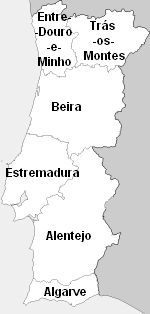|
Inquirições
Inquirições were the Royal Portuguese commissions. They were put forward by the crown in accomplishing edicts. Afonso II of Portugal, Afonso II instituted (from 1220) inquirições to investigate the nature of holdings and to recover whatever had been illegally taken from the crown. This issue was in response to the church's rein over Portuguese land as they supported Afonso's fight in the civil war with Sancho II of Portugal, Sancho II. The General Inquirições The general ''Inquirições'' were issued by King Afonso III of Portugal, Afonso III in 1258 to investigate the nature of holdings and to recover whatever had been illegally taken from the crown. The royal commissions were met with much protest by the prelates as it would have deprived the church of much property. Most of the prelates subsequently left the country. Although Afonso was excommunicated and threatened with deposition, he continued to defy the church until shortly before his death early in 1279. Eventua ... [...More Info...] [...Related Items...] OR: [Wikipedia] [Google] [Baidu] |
Afonso II Of Portugal
Alphons (Latinized ''Alphonsus'', ''Adelphonsus'', or ''Adefonsus'') is a male given name recorded from the 8th century (Alfonso I of Asturias, r. 739–757) in the Christian successor states of the Visigothic kingdom in the Iberian peninsula. In the later medieval period it became a standard name in the Monarchy of Spain, Hispanic and kingdom of Portugal, Portuguese royal families. It is derived from a Gothic name, or a conflation of several Gothic names; from ''*Aþalfuns'', composed of the elements ''aþal'' "noble" and ''funs'' "eager, brave, ready", and perhaps influenced by names such as ''*Alafuns'', ''*Adefuns'' and ''*Ildefonsus, Hildefuns''. It is recorded as ''Adefonsus'' in the 9th and 10th century, and as ''Adelfonsus'', ''Adelphonsus'' in the 10th to 11th. The reduced form ''Alfonso'' is recorded in the late 9th century, and the Portuguese form ''Afonso'' from the early 11th. and ''Anfós'' in Catalan from the 12th Century until the 15th. Variants of the name ... [...More Info...] [...Related Items...] OR: [Wikipedia] [Google] [Baidu] |
Sancho II Of Portugal
Sancho II (; 8 September 1209 – 4 January 1248), nicknamed the Cowled or the Capuched ( pt, o Capelo), alternatively, the Pious ( pt, o Piedoso), was King of Portugal from 1223 to 1248. He was succeeded on the Portuguese throne by his brother, King Afonso III, in 1248. Sancho was born in Coimbra, the eldest son of Afonso II of Portugal by his wife, Urraca of Castile. Military career and reign By the time of his accession to the throne, in 1223, Portugal was embroiled in a difficult diplomatic conflict with the Catholic Church. His father, Afonso II, had been excommunicated by Pope Honorius III, for his attempts at reducing the Church's power within the country. A treaty of 10 articles was signed between the Pope and Sancho II, but the king paid little attention to its fulfillment. His priority was the ''Reconquista'', the reconquest of the southern Iberian Peninsula from the Moors. From 1236 onwards, Sancho II conquered several cities in the Algarve and Alentejo, securing ... [...More Info...] [...Related Items...] OR: [Wikipedia] [Google] [Baidu] |
Afonso III Of Portugal
Afonso III (; rare English alternatives: ''Alphonzo'' or ''Alphonse''), or ''Affonso'' (Archaic Portuguese), ''Alfonso'' or ''Alphonso'' (Portuguese-Galician) or ''Alphonsus'' (Latin), the Boulonnais ( Port. ''o Bolonhês''), King of Portugal (5 May 121016 February 1279) was the first to use the title ''King of Portugal and the Algarve'', from 1249. He was the second son of King Afonso II of Portugal and his wife, Urraca of Castile; he succeeded his brother, King Sancho II of Portugal, who died on 4 January 1248. Early life Afonso was born in Coimbra. As the second son of King Afonso II of Portugal, he was not expected to inherit the throne, which was destined to go to his elder brother Sancho. He lived mostly in France, where he married Countess Matilda II of Boulogne in 1238, thereby becoming count of Boulogne, Mortain, Aumale and Dammartin-en-Goële ''jure uxoris''. Reign In 1246, conflicts between his brother, the king, and the church became unbearable. In 1247, Pope Inno ... [...More Info...] [...Related Items...] OR: [Wikipedia] [Google] [Baidu] |
Trás-os-Montes Province
Trás-os-Montes Province () is one of the medieval provinces of Portugal. The northern part is covered by Terras de Trás-os-Montes and Alto Tâmega, the southern by Douro Subregion. See also * Trás-os-Montes (region) * Trás-os-Montes e Alto Douro Province Trás-os-Montes e Alto Douro () is a historical province of Portugal located in the northeastern corner of the country. Vast plateaus, river valleys, mountains, and castles abound in Trás os Montes e Alto Douro. History A first attempt to regis ... {{DEFAULTSORT:Tras-Os-Montes Province Former provinces of Portugal ... [...More Info...] [...Related Items...] OR: [Wikipedia] [Google] [Baidu] |
Medieval Portugal
The kingdom of Portugal was established from the county of Portugal in the 1130s, ruled by the Portuguese House of Burgundy. During most of the 12th and 13th centuries, its history is chiefly that of the gradual reconquest of territory from the various Muslim principalities (''taifas'') of the period. This process was essentially complete with the ascension of Afonso III of Portugal, the first to claim the title of ''King of Portugal and the Algarve''. The history of Portugal in the period between the death of Afonso III in 1279 and the beginning of the Portuguese Empire in 1415 includes the 1383–1385 Portuguese interregnum and the subsequent transition from the Portuguese House of Burgundy to the House of Aviz. Background Towards the close of the 11th century crusading knights came from every part of Europe to aid the kings of León, Castile and Aragon in fighting the Moors. Among these adventurers was Henry of Burgundy, who, in 1095, married Teresa of León, illegitima ... [...More Info...] [...Related Items...] OR: [Wikipedia] [Google] [Baidu] |
